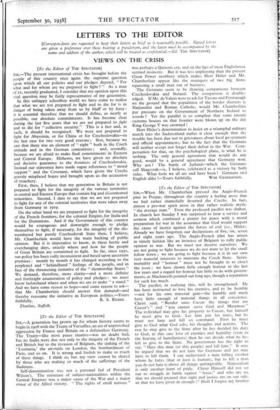VIEWS ON THE CRISIS
LETTERS TO THE EDITOR
[Correspondents are requested to keep their letters as brief as is reasonably possible. Signed letters
are given a preference over those bearing a pseudonym, and the latter must be accompanied by the name and address of the author, which will be treated as confidential.—Ed. THE SPECTATOR] [To the Editor of THE SPECTATOR] SIR,—The present international crisis has brought before the people of this country once again the supreme question upon which all our policies and our pledges depend, " For what and for whom are we prepared to fight ? " As a man of 21, recently graduated, I consider that my opinion upon this vital question may be fairly representative of my generation.
In this unhappy schoolboy world we have come to realise that what we are not prepared to fight and to die for is in danger of being taken away from us by bluff or by force : it is essential therefore that we should define, as' nearly as possible, our absolute commitments. It has become clear during the last five years that we are not prepared to fight and to die for " collective security." This is a fact and, as such, it should be recognised. We were not prepared to fight for Abyssinia, or for China or for Czechoslovakia—in the last case for two very good reasons ; first, because we saw that there was an element of " right " both in the Czech attitude and in the German contentions ; and, secondly, because we are afraid to make final commitments in Eastern and Central Europe. Hitherto, we have given no absolute and decisive guarantee to the frontiers of Czechoslovakia. Instead our statesmen have made vague references to " moral support " and the Covenant, which have given the Czechs gravely misplaced hopes and brought upon us the accusation of treachery.
First, then, I believe that my generation in Britain is not prepared to fight for the integrity of the various territories in central and Eastern Europe that contain big and discontented minorities. Second, I _dare to say that we are not prepared to fight for any of the colonial territories that were taken away from Germany in 1919.
On the other hand we are prepared to fight for the integrity of the French frontiers, for the colonial Empire, for India and for the Dominions. And if the Government of this country would be courageous and downright enough to pledge themselves to fight, if necessary, for the integrity of the dis- membered but purely Czechoslovak State then, I believe, Mr. Chamberlain would have the main backing of public opinion. But it is imperative to know, in these hectic and everchanging days, exactly where and how far the people of Great Britain are committed to fight. So far, since 1931, our policy has been sadly inconsistent and based upon uncertain premises : month by month it has changed according to the perplexed and " behindhand " feelings of the people, and in face of the threatening initiative of the " dictatorship States." We demand, therefore, more clarity—and a more definite and forthright enumeration of policy and pledges : we must know beforehand where and when we are to make " a stand." And we have some reason to hope—and some reason to ask— that Mr. Chamberlain should answer that demand—and thereby reassume the initiative in European politics.—Yours














































 Previous page
Previous page